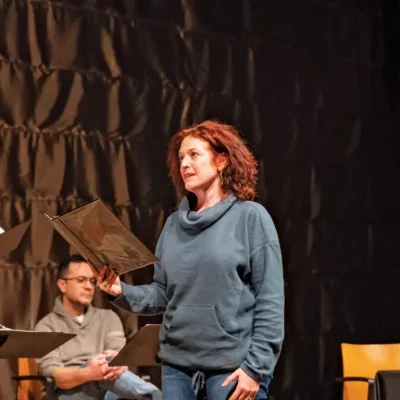
Gunnison Country Times: A spoonful of ‘Sugar’ helps the medicine go down
January 19, 2022 | In the News | No Comments
‘Tiny Beautiful Things’ at the CB Center for the Arts strikes an emotional chord
Performed this past weekend at the Crested Butte Center for the Arts, the novel-turned-play “Tiny Beautiful Things” gives a peek at the universal human condition — both in humor and in suffering — at a time when we need it most.
Before Cheryl Strayed published her best-selling novel “Wild,” a memoir of her 1,100-mile journey on the Pacific Crest Trail, she wrote an advice column called “Dear Sugar” for an online literary magazine. The letters and responses were later combined into a collection of essays which Strayed released as her second best-selling novel, “Tiny Beautiful Things.” It may be hard to imagine converting an advice column into a play, but somehow it works and works effectively as a simple question-and-answer format.
In the Center’s production, the props were few and the set was simple.
Tiny and beautiful
Four chairs are positioned in the middle of the floor. A wooden desk is placed stage left holding a laptop and a tissue box. Four actors take a seat with black binders full of letters resting on music stands. Director Heather Hughes, playing Cheryl Strayed, situates herself behind the desk and opens her computer in a work-from-home wardrobe all too familiar: a comfortable sweatshirt and bare feet. The four actors take turns reading multiple letters addressed to “Sugar.” Each actor plays many different characters seeking advice about rejection, thievery, neglect, marriage, death and even a Santa Claus kink.
The magic of this drama is seeing Strayed’s reactions as the letters are read, performed beautifully by Hughes, through simple facial expressions behind her laptop at her home office. What makes Strayed so successful in her writing, and as a character in the play, is her vulnerability. She answers each letter anonymously, recalling her own life’s darkest moments, instead of with distant, cookie-cutter replies. Strayed relays stories about the loss of her 45-year-old mother to cancer, childhood abuse from her grandfather, her drug use and her divorce from her first husband.
As the play progresses and the situations from her advice-seekers grow more intense and uncomfortable, a seated Strayed moves from typing her responses at her desk to speaking directly to both the letter writer and the audience — a move that helps us transform from spectators at the Center to “Dear Sugar” subscribers.
When confronting someone who angrily signs off as “WTF,” Hughes stands toe-to-toe with actor Steven J. Burge in a gut-wrenching monologue that made me, and undoubtedly others in the audience, wince and look away.
The only physical contact in the play is from a grieving father, played by Rondey Lizcano, who has lost his young son in a car accident involving a drunk driver. His question is not really a question, but a list of facts he cannot bear, addressed to Sugar. Strayed replies to him in a tearful list as well. At the end, Lizcano clutches Hughes’ shoulder. The pair do not look at each other, symbolizing the tangible energy that empathetic words can have from writer to reader.
Strayed eventually reveals her real name to the “Dear Sugar” followers and says to us, “We are all Sugar.”
From a pandemic perspective
The audience in the Center’s Steddy Theater was so quiet and transfixed that every time I remembered to take a picture for the newspaper, I would cringe at the sound of the camera. I even took my boots off to silently wander around for different photo angles. It was hard not to applaud after each stand-alone response. Once the play was over, we stood and clapped. Tears rolled into my mask.
After being adapted into a play, “Tiny Beautiful Things” was featured off-Broadway in 2016. Playwright Nia Vardalos, also the writer and star of “My Big Fat Greek Wedding,” could not have known that audiences in 2022 would be virtually interacting with strangers almost exclusively. In the original production, Strayed is surrounded by her children’s toys and laundry inside of a living room. The stripped-down version at the Center showcases props that have strong connotations during a pandemic that has forced remote work.
For me, there was an overarching sorrow that the threat of illness is heaped on top of the human experience. Life continues no matter what germs surround us. Though the stories from the letters were very specific, they felt like my own.
A reiki practitioner once told me emotions are meant to be felt. That way, they can be released. “Tiny Beautiful Things” allowed us not only to sit still in our grief, but to laugh together, masked. What a strange time. What wonderful medicine.
(Anna Coburn can be contacted at 970.641.1414 or anna@gunnisontimes.com.)

Reader Interactions